November 3, 2025
Top 10 Resume Screening Software Solutions for 2025
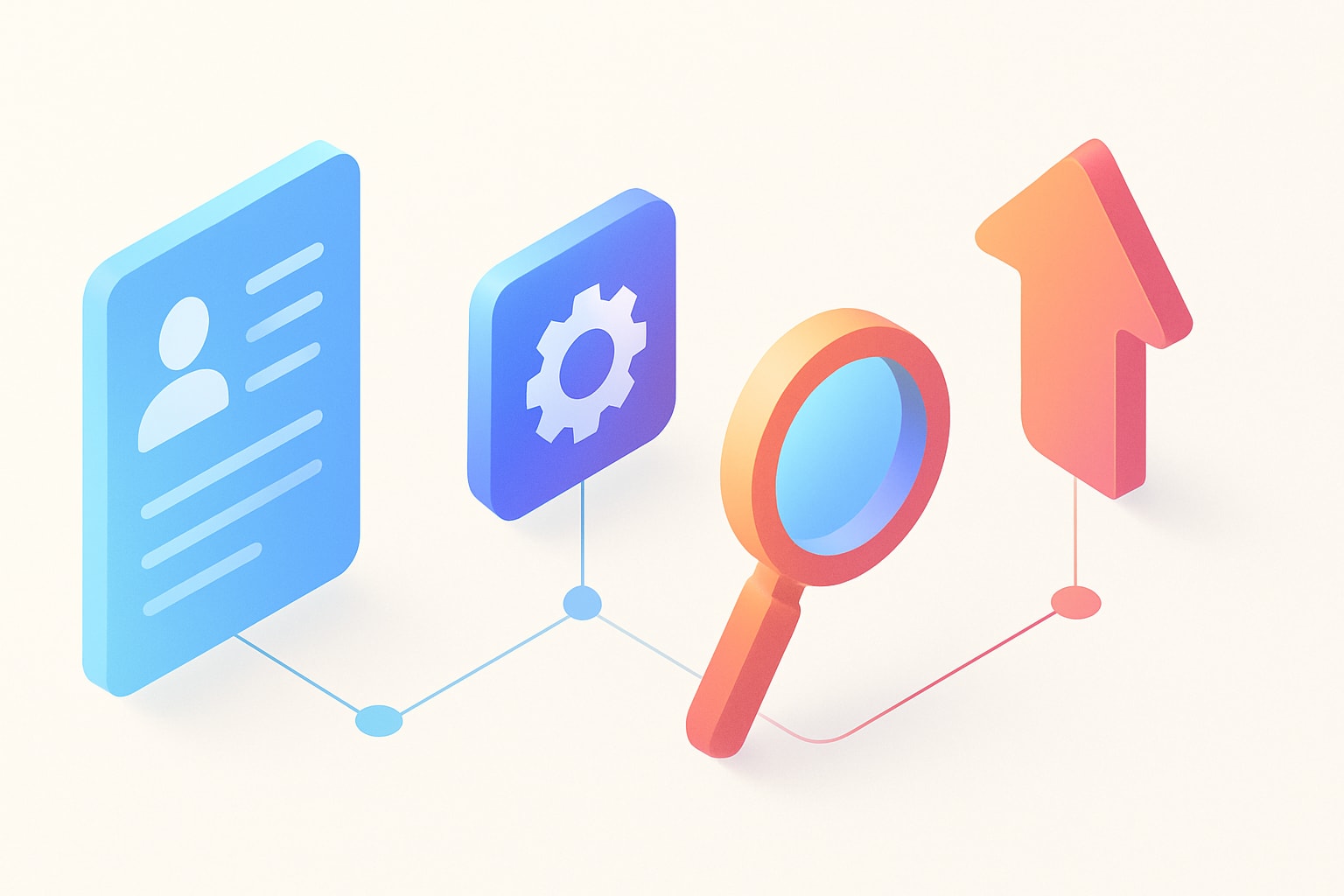
In 2025, recruiters face an unprecedented flood of applications for every open role, making manual candidate review nearly impossible. The demand for smarter, faster, and more accurate hiring processes has made resume screening software essential for organizations of all sizes. This article examines the top 10 resume screening software solutions that are transforming recruitment through AI and automation. Discover how these platforms save time, reduce bias, and improve candidate quality. We will explore each tool’s standout features, unique benefits, pricing, and best-fit scenarios to help HR professionals and recruiters make informed decisions.
The Evolution of Resume Screening Software
Recruiters have long faced the daunting task of sorting through stacks of resumes by hand, a process fraught with inefficiency, human error, and unconscious bias. Traditional methods often meant qualified candidates were overlooked while recruiters spent countless hours on repetitive tasks. As job applications surged, especially for high-demand roles, the limitations of manual resume screening became increasingly apparent.
The digital revolution brought the first wave of change, with early resume screening software designed to automate basic filtering. However, these initial tools relied heavily on keyword matching and often failed to capture the true depth of a candidate’s experience. The exponential rise in online applications for every mid-level position—often exceeding 400 applicants within days—put even more pressure on human resources teams to find smarter, faster solutions.
Modern resume screening software harnesses artificial intelligence to tackle these challenges head on. By leveraging natural language processing and machine learning, today’s platforms can parse, score, and rank candidates with remarkable accuracy. Predictive analytics now allow recruiters to identify talent based on skills, experience, and even potential cultural fit, moving far beyond simple keyword detection.
The impact is transformative. AI-driven resume screening software has reduced screening times by over 90% and raised shortlist accuracy for both technical and management roles. As adoption accelerates, industry studies reveal that 83% of companies are using AI for resume reviews by 2025, underscoring the shift to data-driven recruitment. These advancements not only ease recruiter workloads but also enhance the candidate experience, setting a new standard for hiring in the digital era.
Key Features to Look for in 2025 Resume Screening Tools
Selecting the right resume screening software can define the success of your recruitment strategy in 2025. As hiring volumes climb and candidate pools diversify, understanding which features truly matter is essential for HR professionals and recruiters.
Modern resume screening software starts with advanced resume parsing. This technology reads and extracts structured data from every applicant’s resume, enabling faster and more accurate evaluation. High-quality parsing tools can process formats from PDFs to Word documents, recognizing skills, experience, and education with precision. To learn more about the importance of parsing, review the key features of resume parser tools.
Customizable scoring is another critical feature. Top resume screening software platforms allow organizations to set unique evaluation parameters, weighting skills, certifications, or experience according to the role. This ensures that candidate ranking aligns with your business’s exact needs, rather than relying on generic filters.
Seamless integration with Applicant Tracking Systems (ATS) is vital for workflow efficiency. The best resume screening software automates repetitive tasks such as sending follow-up emails, scheduling interviews, and engaging candidates through chatbots. For instance, Whippy’s automated engagement streamlines communication, while predictive analytics forecast candidate success, reducing turnover and supporting better hiring decisions.
Bias reduction features are a major advancement in resume screening software for 2025. Tools like Greenhouse offer anonymization, removing identifiable information to minimize unconscious bias. Structured scoring rubrics and consistent evaluation processes further promote fairness and compliance with diversity initiatives, while advanced analytics dashboards give actionable insights into hiring trends and outcomes.
Real-world results show that resume screening software can cut screening times by over 90 percent and boost hiring accuracy, especially for technical and management positions. Predictive analytics help organizations identify top talent faster, while automated engagement ensures a positive candidate experience. These features empower HR teams to focus on building relationships and making strategic hiring decisions.
Top 10 Resume Screening Software Solutions for 2025
Navigating the crowded landscape of resume screening software can be challenging for recruiters aiming to streamline their hiring process in 2025. With hundreds of platforms available, choosing the right solution is essential to save time, reduce bias, and improve candidate quality. Below, we review the top 10 platforms revolutionizing recruitment with AI and automation, examining their unique features, pricing, benefits, and best-fit scenarios. Whether you work at a fast-growing startup or a global enterprise, this guide will help you identify the resume screening software that aligns with your hiring needs.
Klearskill
Klearskill stands out in the resume screening software market for its AI-powered approach and flexible pricing. The platform is free for startups, offers a free trial, and provides tiered plans for scaling organizations. Core features include advanced AI-driven screening and ranking, customizable evaluation parameters, seamless ATS integration, a visual kanban workflow, and a robust analytics dashboard.

Klearskill delivers measurable benefits, including a 92 percent reduction in screening time, 99 percent bias reduction, and 97 percent match accuracy for technical roles. Its plug and play setup enables teams to deploy resume screening software quickly without complex onboarding. Organizations with high application volumes, from startups to enterprises, benefit from its consistent, bias-free candidate evaluation.
Pros include fast onboarding, strong analytics, and high customization. The main drawback is that advanced customization may require some initial setup. For a deeper look at how AI resume screening is transforming efficiency, see this AI resume screening reduces hiring time by 50% case study.
Greenhouse
Greenhouse is a leader in resume screening software, especially for companies prioritizing structured and unbiased hiring. Pricing is available upon request, with a demo for evaluation. Its core features include multilingual resume parsing, resume anonymization, automated screening workflows, comprehensive reporting, and integrated ATS capabilities.
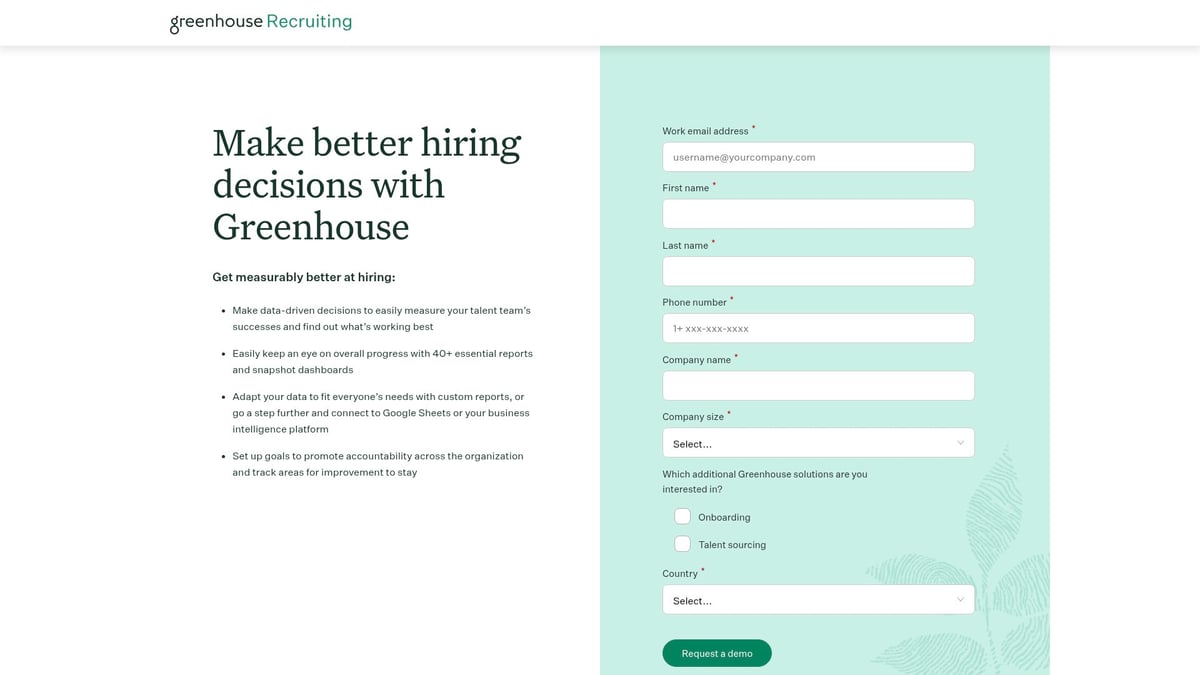
The platform helps reduce hiring bias and supports global recruitment efforts. Its structured approach and customizable interview kits make it an excellent choice for enterprises, international teams, and diversity-focused organizations. Greenhouse’s analytics platform enables HR teams to make data-driven decisions and improve hiring outcomes.
Pros include robust integrations, customizable workflows, and strong analytics tools. Some limitations are fewer social media integrations and room for improvement in candidate search. Greenhouse remains a top pick for organizations needing reliable, scalable resume screening software in 2025.
Workable Recruiting
Workable Recruiting offers a powerful resume screening software solution tailored for SMBs, agencies, and high-volume recruiters. The platform starts at $299 per month after a 15-day free trial, making it accessible for growing businesses. Key features include AI-powered candidate sourcing, advanced resume filtering, bulk resume processing, and customizable pipelines.
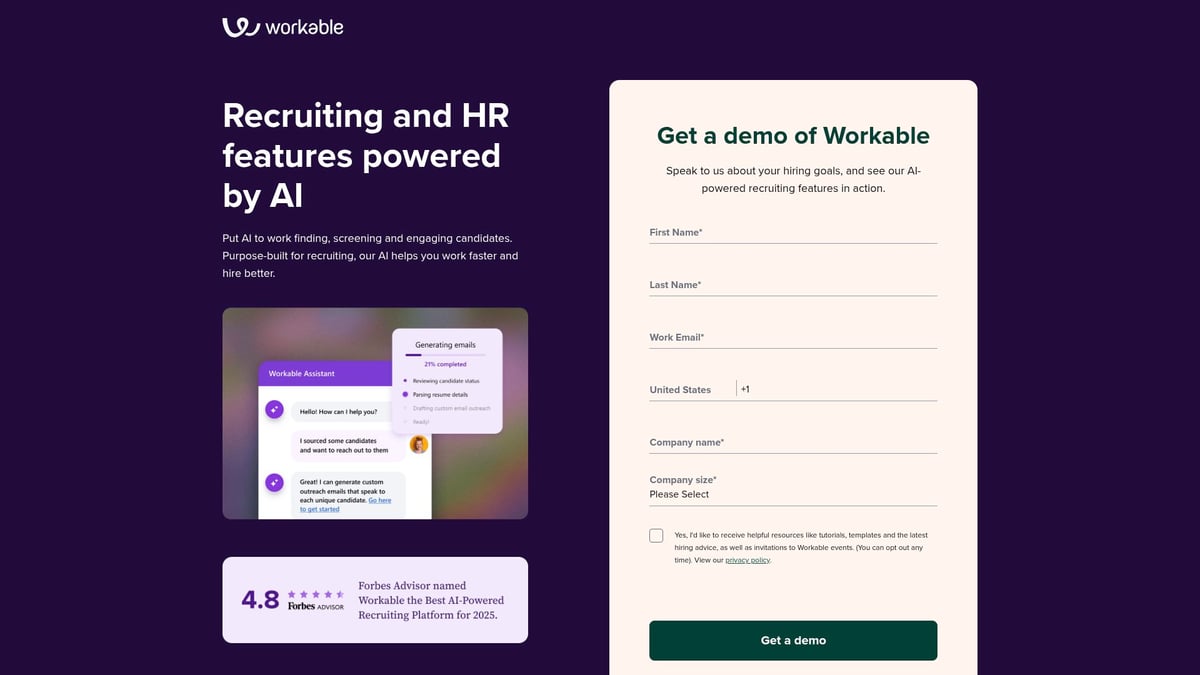
Workable automates candidate ranking and reduces manual review time. Its intuitive interface ensures easy setup and onboarding, allowing recruitment teams to focus on engaging the best talent. The platform’s scalability supports organizations as hiring needs evolve.
Pros are its user-friendly design, strong filtering capabilities, and scalability. However, some advanced features may only be accessible on higher-tier plans. Workable remains a go-to resume screening software for teams seeking efficiency and automation without sacrificing ease of use.
CVViZ
CVViZ brings a context-aware approach to resume screening software, catering especially to staffing agencies, tech recruiters, and large HR teams. Pricing is available upon request, and a demo is offered for evaluation. The platform’s core features include contextual candidate tracking, AI-powered resume parsing, smart candidate ranking, and skill-based matching.
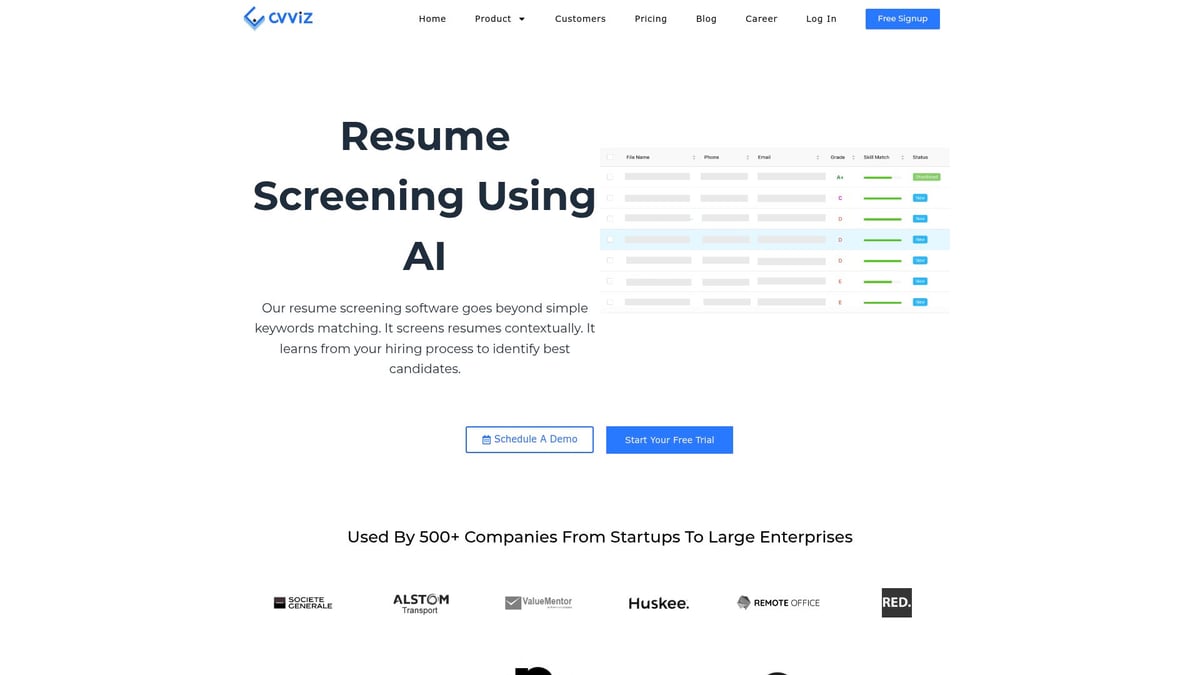
CVViZ excels at context-aware shortlisting, reducing manual screening and supporting various job types. Its integration capabilities make it a reliable choice for bulk hiring scenarios. The platform’s strong contextual analysis ensures that candidates are shortlisted based on relevance, not just keywords.
Pros include high-quality analysis, easy integration, and suitability for large-scale recruitment. The main drawback is that the user interface can be complex for new users. CVViZ is a solid resume screening software option for organizations needing depth and flexibility in candidate evaluation.
myInterview
myInterview pairs AI-powered resume screening software with video interviewing capabilities, making it ideal for companies that value both technical and soft skills. Pricing is available upon request, and a demo can be scheduled. The platform features automated resume screening, video interviewing, candidate shortlisting, and chatbot-driven engagement.
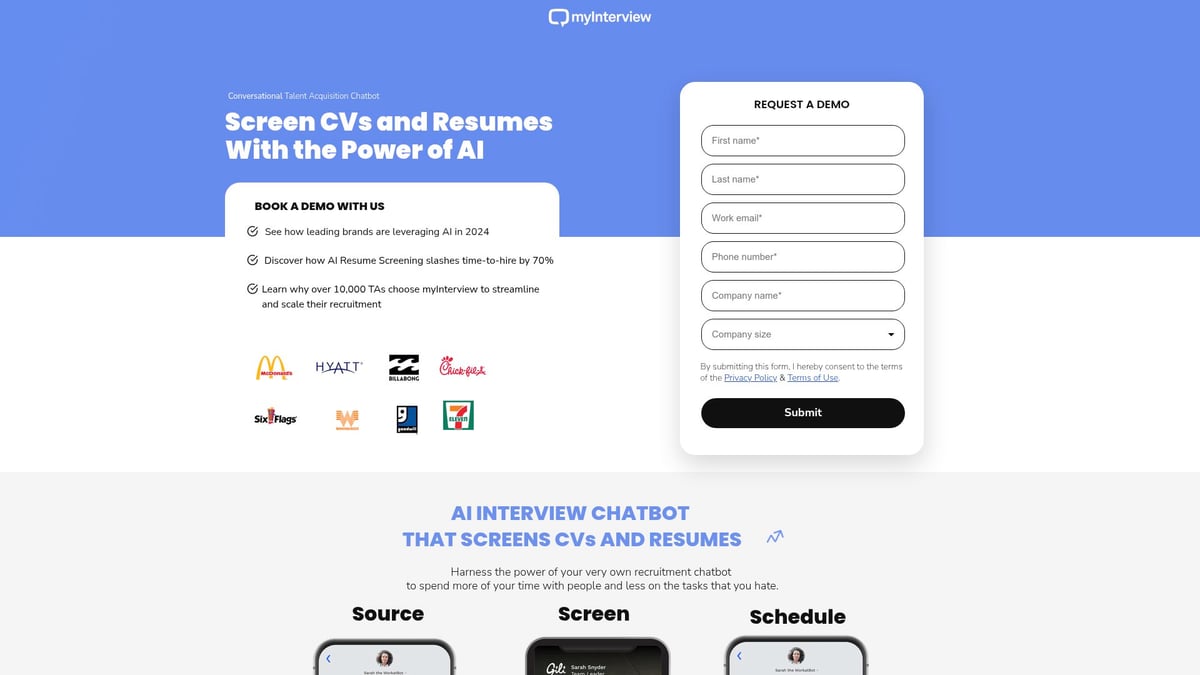
By combining resume and video screening, myInterview boosts candidate engagement and reduces screening bias. It is particularly effective for remote hiring and customer-facing roles, where assessing communication skills is crucial. The user-friendly interface ensures smooth adoption by HR teams.
Pros are the seamless video integration, AI chatbots, and intuitive design. A limitation is less customization for technical roles. myInterview stands out as one of the most engaging resume screening software solutions for modern, candidate-centric organizations.
Daxtra Technologies
Daxtra Technologies is a robust resume screening software platform built for multinational companies, agencies, and organizations with complex or legacy databases. Pricing is available upon request. Daxtra’s core features include semantic search, multilingual resume parsing, database sourcing, and AI-driven candidate matching.
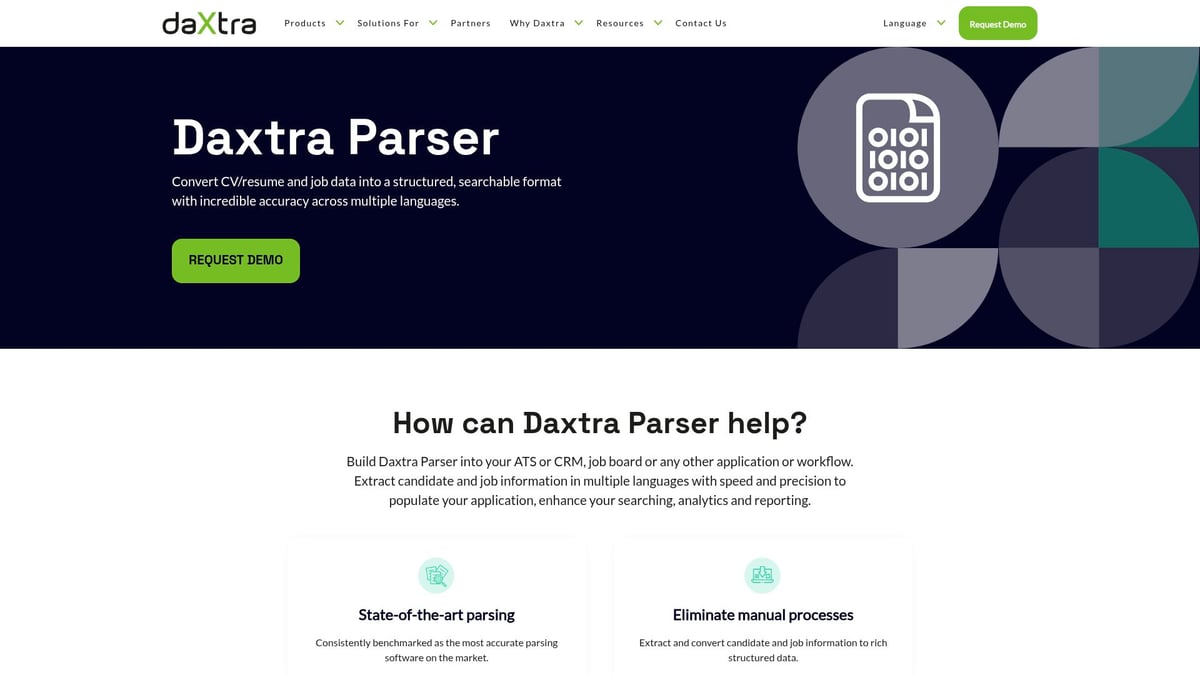
The platform locates candidates across multiple databases and supports global hiring strategies. Its advanced search capabilities enable recruiters to find candidates with highly specific skill sets, even in large datasets. Daxtra scales with organizational growth and integrates with existing HR systems.
Pros include powerful search functions, extensive language support, and scalability. The main cons are the lack of transparent pricing and potential setup complexity requiring IT support. Daxtra is a preferred resume screening software for enterprises managing large, diverse talent pools.
Freshteam
Freshteam delivers accessible resume screening software for small to mid-sized businesses and HR teams seeking simplicity. The platform offers a free plan, with paid options starting at $1 per employee per month. Core features include deep resume parsing, pre-screening tests, automated candidate scoring, and integration with the Freshworks suite.
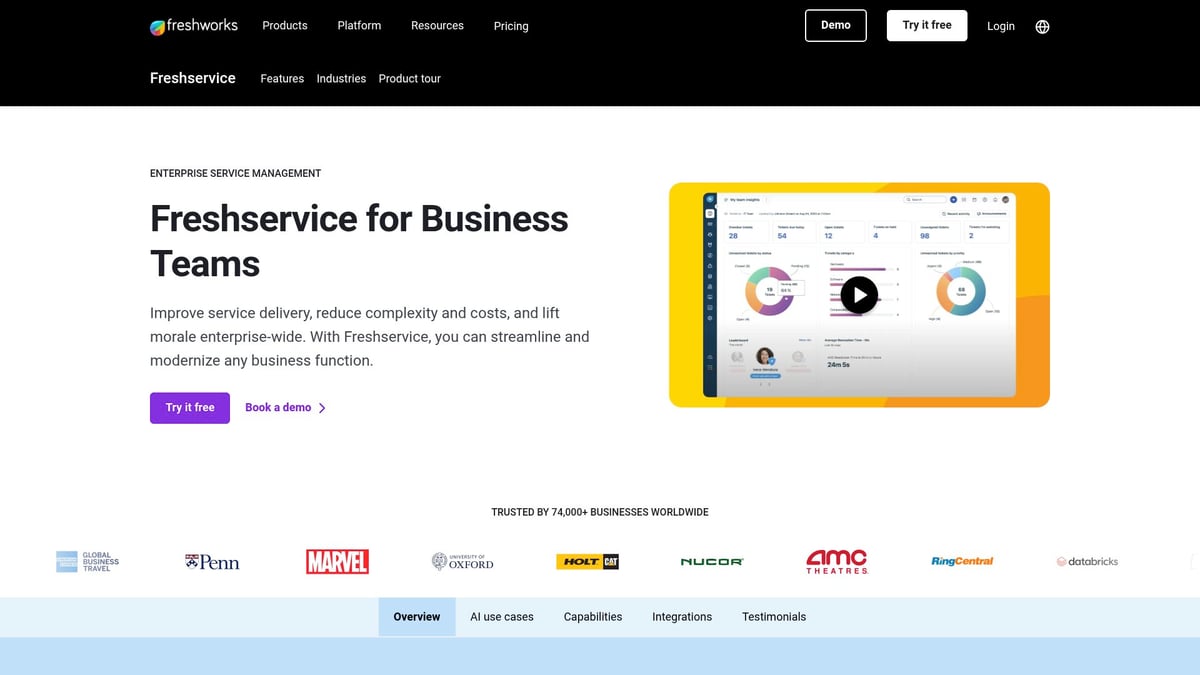
Freshteam streamlines pre-screening and scoring, helping smaller organizations compete for talent efficiently. Its affordability and easy-to-use interface make it a practical choice for growing companies. Integration with other Freshworks products enhances workflow efficiency.
Pros are its ease of use, low cost, and suitability for scaling businesses. Cons include limited advanced analytics and fewer integrations compared to enterprise-level tools. Freshteam remains a leading entry-level resume screening software option for budget-conscious teams.
JazzHR
JazzHR is a customizable resume screening software solution tailored for small businesses, agencies, and organizations needing flexible workflows. Pricing is available upon request, with a demo for interested teams. The platform’s features include customizable recruiting pipelines, resume parsing, candidate ranking, and collaborative hiring tools.
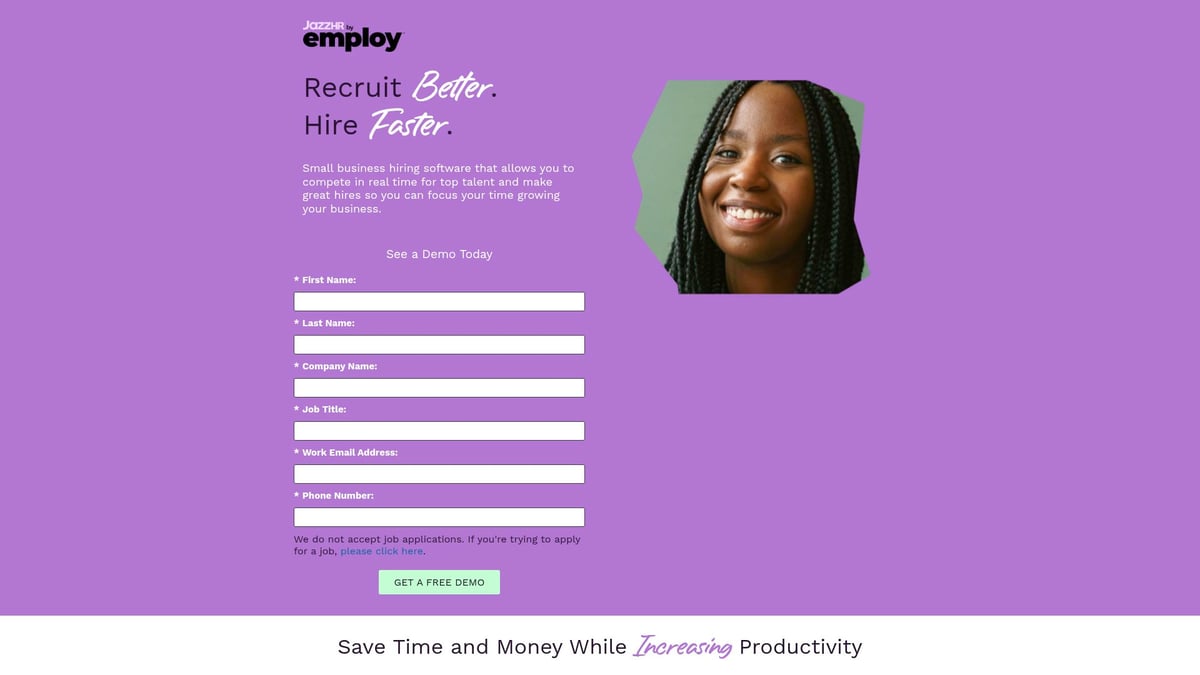
JazzHR empowers teams to design tailored workflows, facilitating collaboration and efficient decision-making. Its affordability and flexibility make it attractive for SMBs seeking to optimize their hiring process without overinvesting.
Pros are high customization, affordability, and strong collaboration features. The main limitations are that advanced analytics require add-ons and enterprise features are limited. JazzHR is a reliable resume screening software for organizations that value workflow control and team input.
RecruiterCloud
RecruiterCloud focuses on personalized automation in resume screening software, making it a strong choice for agencies, tech startups, and talent acquisition teams. Pricing details are provided upon request. Features include personalized candidate outreach, tailored screening, automated scheduling, and an integrated CRM.
The platform strengthens candidate relationships and automates outreach, supporting passive talent sourcing and engagement. RecruiterCloud’s integrated CRM helps recruiters manage long-term candidate pipelines with ease.
Pros are its personalized automation, CRM integration, and robust outreach tools. The learning curve for new users and undisclosed pricing are possible drawbacks. RecruiterCloud is a top resume screening software for teams looking to build strong candidate connections and streamline sourcing.
Ideal
Ideal is a purpose-built resume screening software for enterprises with diversity initiatives and compliance needs. Pricing is available on request. Key features include bias-free resume screening, AI-powered candidate matching, diversity analytics, and seamless ATS integration.
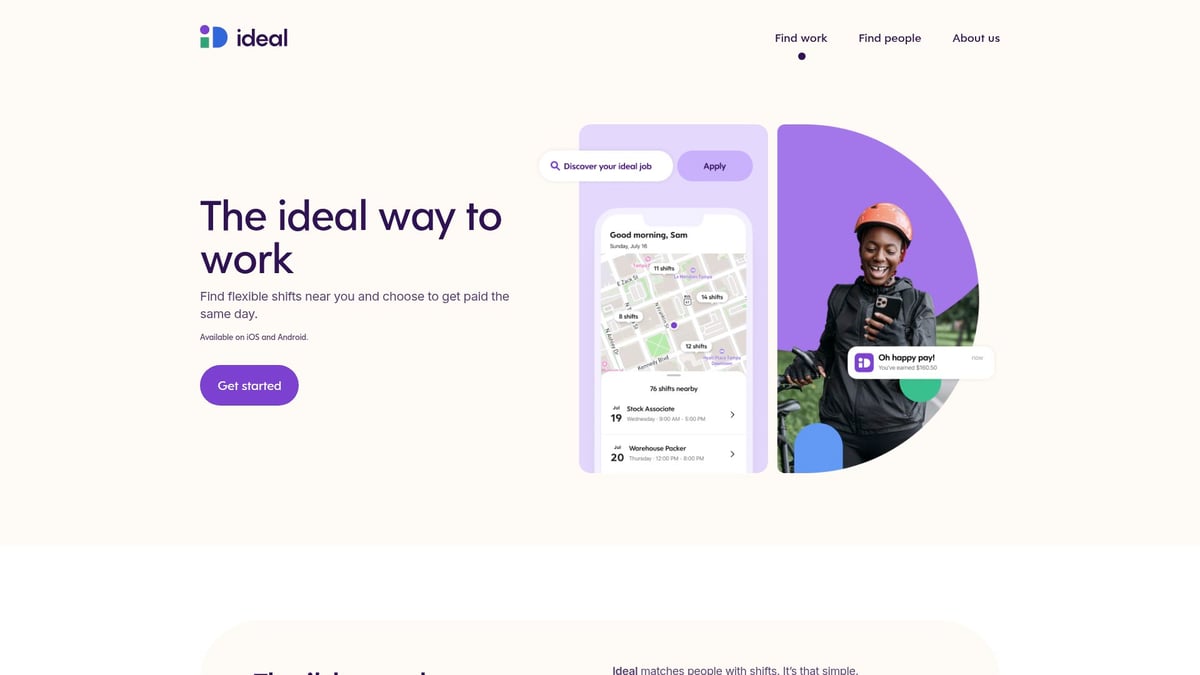
Ideal’s focus on eliminating hiring discrimination and promoting equality sets it apart. The platform supports diversity hiring goals and provides analytics to measure progress. Its ATS integrations ensure smooth adoption within existing HR ecosystems.
Pros are its emphasis on equality, strong analytics, and integration capabilities. Customization may require support, and pricing is provided upon request. Ideal is a leading resume screening software for organizations committed to fair, unbiased hiring practices.
How AI and Automation Are Transforming Candidate Screening
Artificial intelligence and automation are redefining the landscape of resume screening software. In 2025, recruiters are leveraging these technologies to address the challenges of high-volume hiring, complex skill requirements, and the demand for a better candidate experience. By automating repetitive tasks and introducing advanced analysis, resume screening software is enabling HR teams to focus on building stronger teams instead of sifting through endless piles of resumes.
Modern resume screening software uses machine learning models that go far beyond simple keyword matching. These systems analyze a candidate’s skills, employment history, and even subtle language cues to determine both technical fit and cultural alignment. For example, AI screening tools analyzing language patterns and cultural fit allow recruiters to identify top candidates who may excel not just on paper, but within the actual work environment. This shift has led to more accurate shortlists and reduced the risk of overlooking talented individuals who might not use traditional keywords in their resumes.
Predictive analytics is another critical advancement within resume screening software. By examining patterns across thousands of successful hires, these tools can forecast a candidate’s potential for long-term success and flag those who are more likely to stay with the company. This data-driven approach helps organizations reduce turnover rates and avoid costly hiring mistakes. As a result, companies are seeing measurable improvements in employee retention and overall team performance.
Automation also enhances the candidate experience, making every stage of the process smoother. Resume screening software now integrates with chatbots to provide instant feedback, schedule interviews, and answer candidate questions. Automated communications keep applicants informed and engaged, which boosts conversion rates and leaves a positive impression of the employer brand. According to industry reports, AI-driven platforms have reduced interview-related costs by up to 95 percent while also cutting down on bias by 99 percent through anonymized screening.
The evolution of resume screening software means recruiters can dedicate more time to strategic hiring and relationship-building. By removing manual bottlenecks, these solutions empower HR teams to make faster, data-backed decisions. To explore the broader advantages of AI in recruitment, see the benefits of AI in recruitment, which include efficiency, fairness, and higher quality placements.
The future of candidate screening is bright, with automation and AI working together to bring unprecedented accuracy, speed, and fairness to the recruitment process. Organizations that invest in modern resume screening software will find themselves ahead in the race for top talent.
Choosing the Right Resume Screening Software for Your Organization
Selecting the best resume screening software can be a pivotal decision for any HR team or recruiter. With so many solutions on the market, the process can feel overwhelming. The right choice streamlines hiring, improves candidate quality, and aligns with your organization's unique needs.
Begin by considering your company’s size, hiring volume, and industry. For startups or smaller businesses, free or low-cost plans may offer the essential features without overextending budgets. Larger enterprises, on the other hand, often require advanced analytics, global support, and the ability to handle high volumes of applications. Assess how each resume screening software integrates with your existing tech stack, such as your ATS or HRMS, to ensure a seamless workflow.
Scalability is a key factor. As your organization grows, your resume screening software should adapt to increasing demands without sacrificing performance. Look for platforms offering customizable workflows, robust analytics, and user-friendly interfaces. Evaluate customer support and onboarding resources as well, since strong support reduces downtime and helps your team maximize the software’s potential.
Before making a final choice, take advantage of free trials, demos, or pilot programs. These opportunities allow your team to experience the software’s features firsthand and evaluate its impact on your hiring process. Pay close attention to automation capabilities, such as automated follow-ups and candidate engagement tools. For a deeper dive into how these features can transform recruitment, explore Automated resume screening explained.
Cost is always a consideration, but it should be balanced against long-term return on investment. Startups may benefit from free tiers, while enterprises should focus on advanced features and scalability. Consider real-world testimonials or case studies that highlight measurable improvements in time-to-hire, candidate quality, and bias reduction. Many organizations have found that investing in the right resume screening software leads to more consistent, data-driven hiring decisions and a stronger talent pipeline.
The landscape of resume screening software continues to evolve, shaped by advances in AI and automation. By carefully assessing your needs, utilizing trial options, and prioritizing integration and scalability, you can select a platform that delivers measurable value. For further insights into the transformative role of AI in talent acquisition, visit AI in the recruitment process.
